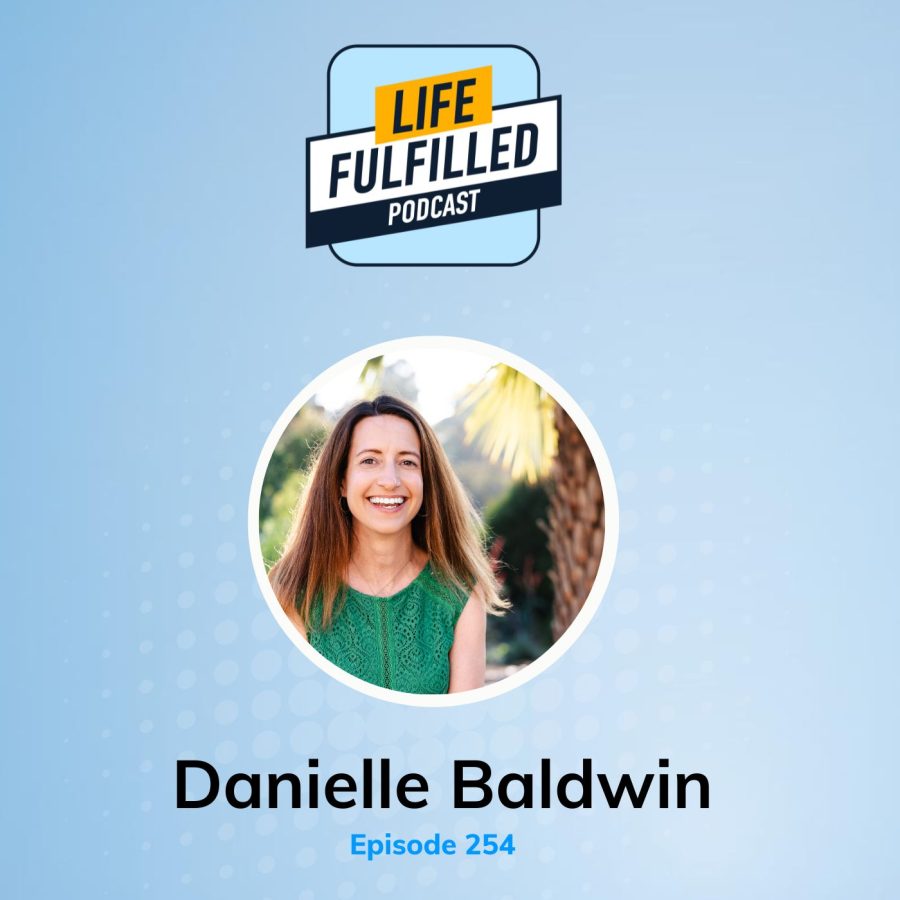Bernie Borges [00:00:00]:
What if I told you that one of the most powerful forces in your life, one that can pull you out of burnout, realign your purpose, and even boost your performance at work, isn’t motivation or discipline, it’s inspiration. Well, in this episode, we’re diving into how inspiration can spark action, guide transformation, and lead to the ultimate emotional payoff. Fulfillment. And my guest, Danielle Baldwin, has literally written the book on this. Danielle, welcome to the Life Fulfilled podcast.
Danielle Baldwin [00:00:36]:
Bernie, thank you for having me.
Bernie Borges [00:00:38]:
Thank you so much for joining me. I’m excited for a conversation. You are an executive coach. You are a Vistage chair. You’re the author of the, at the time of this recording, upcoming book, Sparking Greatness, publishing in late October of 2025. Is that right?
Danielle Baldwin [00:00:56]:
That’s correct.
Bernie Borges [00:00:57]:
Okay. And you work with CEOs, business owners, and leadership teams who are ready to grow with intention. You have a why behind empowering others to become the best version of themselves. And I love that. That alone inspires me, Danielle. So let’s begin with just exploring the definition of. Of inspiration. Let’s start there.
Danielle Baldwin [00:01:22]:
So inspiration in its simplest form. The examples I use in the book are those moments where you’re in the shower and you got a healthy lather going, and then all of a sudden, bam, you’ve got that great next idea, or you’re out for a jog and you’re just listening to your feet hitting the pavement and like, bazinga. Right. It is these moments that come to us that provide us this tremendous amount of clarity. It provides us this lightness, and it feels very limitless in the moment. Right. So that’s how we know when we have that moment of inspiration. By nature, they’re fleeting, but it’s just that, like, they’re great.
Bernie Borges [00:02:02]:
Okay. You know, I can relate. I’ve actually heard people say, danielle, I don’t know if you’ve heard this. People say that they actually have installed some kind of a note taker in the shower just for that reason.
Danielle Baldwin [00:02:13]:
Absolutely, absolutely. It’s the notepad by the side of the bed, right?
Bernie Borges [00:02:18]:
Yeah, yeah, yeah, yeah. What about inspiration in organizations at the leadership level? Talk to that.
Danielle Baldwin [00:02:26]:
I think inspiration in organizations can look a lot of different ways. One of the questions that I get frequently is like, do I really need this? And to be quite frank, the answer is no. You can run a successful, steady, growing organization without inspiration. But here’s what I would say about that. We find a few different things when people actually have inspiration in their organization. We find that the employees have greater vision and perspective we find that they have elevated performance. So Bain & Co. Did a study a few years back where they separated employees into these three tiers on a pyramid.
Danielle Baldwin [00:03:10]:
So they looked at satisfied employees, they looked at engaged employees. And then the top tier of that pyramid was inspired employees. And the way that they defined that is an inspired employee is somebody that aligns with the vision, the mission, the goal, not only of the organization, but also the leadership. So then they said, okay, how does this play out from a performance, performance per se? And the easiest way to explain this is when coming across a problem. A satisfied employee will gather other satisfied employees and they’re going to meet and they’re going to talk about it. An engaged employee will go looking around the office for a ladder and an inspired employee is going to run through the wall. And when we look at what that looks like in real life, that is about 250% more, a lot more productive, a lot more engaged. So that when you look at what an inspired employee will do for your organization, the answer is quite a bit.
Bernie Borges [00:04:11]:
So as I think about connecting that to fulfillment, because I don’t think that’s going to surprise you that I’m going there right away or early in our conversation and I look at those, those three tiers. Satisfied, engaged and inspired. To me, inspired is synonymous with fulfilled because fulfilled is someone that’s got purpose, someone that is passionate. They care, they’re cared for and they’re, they’re willing, ready, willing and able to, what did you say? Go through a wall to, to get something done. Would you agree?
Danielle Baldwin [00:04:47]:
Yeah, I think that, that, that, I think that that is very similar. Right. I think fulfillment, when they feel that deep sense of purpose, it’s really hard. And one of the things that I talk a lot about inspiration with your employees starts from hiring because if you bring somebody, one of the mainstays of inspiration is there’s an alignment of goals or values. So I’ll give you a silly example. Let’s say you have a good friend who chooses to do an ironman and you’re like, dang, that is a lot of training, that’s a lot of running, that’s a lot of biking and swimming. Now, Bernie, if you are excited about fitness, if you have fitness goals, if you’ve always thought about doing an ironman but you haven’t done it, that will be inspiring to you. If not, you can be inspired by.
Danielle Baldwin [00:05:40]:
Because there are two different types of inspiration. Inspired by means you feel that sense of inspiration, but it doesn’t generate actin. But you’re not going to be inspired to. So when we pull that back into an organization, what we find is if we are not even in the hiring process looking for employees that align with our vision and our goals, then we’re going to have a much tougher time inspiring them.
Bernie Borges [00:06:04]:
Okay, and is there a correlation between inspired employees and employee retention? I think you mentioned that there’s definitely a correlation with productivity, which I think I’ve come across data like that myself. But what about employee retention?
Danielle Baldwin [00:06:21]:
So I work with a bunch of different companies and I have one in particular. They are a pest control company. Right. So nobody’s idea of fun or most people’s is not like crawling under a house looking for pets. And we agree on that. Right? Like, thank you. Let’s go look for roaches and mice. However, when we look at this company, which is family owned, third generation, and we look at their retention rates, average retention rates in that space base here in San Diego is about four and a half years.
Danielle Baldwin [00:06:48]:
I think that’s actually closer to a nationwide statistic. And when we look at this specific organization, they’re at eight and a half. And they have aligned along these three main visions and values, which is family care and security. So we treat our employees like family. We have deep care for our customers and we provide security not only for our employees, but, but also for our clients by giving them safe spaces to live and work in. And it has generated this inspiration, has generated this deep employee retention. And it’s a great organization.
Bernie Borges [00:07:24]:
Terrific. Thank you for sharing this story. It’s a great story. Okay, I know you’ve got something Danielle called the chart framework of inspirational stories. And chart is an acronym. So let’s go there, unpack that for us.
Danielle Baldwin [00:07:40]:
I am happy to. So we have all watched, listened, read tons and tons of inspirational stories. And so I was curious about if there were any things that. If there were threads that tied them together. And I found five, which is how we came up with the chart. So the five elements of an inspirational story that I have found universal are courage, hardship, authenticity, resilience and transformation. Those are the five. All very important.
Danielle Baldwin [00:08:14]:
So kind of quick examples, like courage is important and it’s different from bravery because it’s the moments where we feel the fear and we do it anyway. So superheroes. Do you love superheroes? I freaking love those superhero movies. I will go watch a Marvel movie any day. But there’s not a lot of courage in them. Like, do we see Superman, like freaking out in the phone booth? No, we don’t. Not a Lot of courage there. Right? So not tremendously inspirational because he’s not like, oh, my goodness, can I do this? He’s like, I’m doing it right.
Bernie Borges [00:08:46]:
Yeah.
Danielle Baldwin [00:08:47]:
When we think about hardship, if something’s easy and there’s not anything to overcome, then we’re kind of like, yep, that’s great. You know, no worries. An example of authenticity would be Lance Armstrong. I think as a country and maybe even as a world, we were all so inspired by his story of someone who had overcome such a grave disease and had risen to the top of his field. And in the moment when the doping scandal broke and we realized the authenticity dropped out of that, so did the inspiration, resilience. That’s doing something over and over and over again. So sometimes we can be inspired by, like, the mom that lifts the car off of the kid when the car comes over. But really where we find more inspiration, even in the surveys I’ve done, it’s in somebody that shows, like, some discipline and some repeated behavior.
Danielle Baldwin [00:09:39]:
And then the one that really gets us is transformation. And it doesn’t have to be physical. It can be someone is so different or changed by the experience they’ve gone through. So that can be something like Viktor Frankl. I would say that’s probably the most universally acknowledged inspirational story. Or it can be an addict that gets sobriety. It can be somebody escaping from domestic violence. Right there.
Danielle Baldwin [00:10:04]:
There are these transformations that are really beautiful that open us up.
Bernie Borges [00:10:09]:
So, Daniel, is the idea that this chart acronym, again, Courage, Hardship, Authenticity, resilience, and transformation, that those are the sort of the. The ingredients that go into inspirational stories, Is that the. The connection there? Is that for. For a story to be inspirational, that those five ingredients need to be in place?
Danielle Baldwin [00:10:29]:
Yes. So some of the things that I’ve done in the book at the end of chapters is there are exercises for you to take back. Right. Because we want to inspire ourselves or work on inspirational stories for ourselves, but also for an organization. So looking at a time where, let’s say we’re building an inspirational story for an all employee meeting, you know, when has the organization gone through hardship? Like, how were they authentic about it? How did they show up? And what was the resilience they showed? And their exercise around all of these, all of chart and the other parts of the book, too, can really help you hone in on what that might be. So you can present a framework and a story that’s within that partner.
Bernie Borges [00:11:11]:
Okay. One of the things that I talk about and you talk about, we have this in common, is Burnout.
Danielle Baldwin [00:11:17]:
Oh, my gosh.
Bernie Borges [00:11:17]:
And misalignment, right? That’s. We see that pretty much on a daily basis in. In the. In the workplace that, you know, where we work with clients, that sort of thing. So let’s connect inspiration to burnout and misalignment in the role that it plays.
Danielle Baldwin [00:11:33]:
So for me, it’s not uncommon. I. I just had a meeting today with a new client. I think you’re probably seeing it too, Bernie. Like, I’ve seen so much more burnout. And burnout, in my mind is just this. It’s kind of the next step beneath overwhelm. And they’re different.
Danielle Baldwin [00:11:52]:
So overwhelm is like you’ve got all these bags of groceries and keys and a coffee cup and a dog leash, and you are like staggering along the sidewalk, right? That is overwhelm. Burnout is when you face plan the challenge with inspiration. And burnout is if we think of inspiration as like seeing the top of a mountain. When you’re in burnout, you’re at the bottom of the ocean. So we need to get you up to sea level before we can pull you up. So that is anything from. Things that I talk about are like an information diet, because when you’re in burnout or overwhelm, your aperture is too open. And so what we need to do is focus you so that you are not having so many inputs and you’re not so overwhelmed.
Danielle Baldwin [00:12:36]:
And then we can kind of bring you up to the surface. And then we. Once we bring you up to the surface, we can work on the three precursor states to inspiration, which are spaciousness, stillness, and self forgetfulness. And then we can pull you up.
Bernie Borges [00:12:49]:
What about the role of expectations? You know, that part of what I think in some cases can contribute to burnout or frustration or misalignment is that we have these expectations that sometimes we place them on ourselves, sometimes they’re placed on us sort of by default, being where, you know, in the situation that we’re in, especially if you’re running a business and there’s certain expectations that, you know, that people are depending on. How does that fit in? What’s the role of expectations and inspiration?
Danielle Baldwin [00:13:18]:
It is a big one. So one of the things that’s really interesting about, I think life in general is the person that gets in the way, the most of us is us. So the judgment we have. There’s the section in the book that I talk about the judge, right? It’s that voice that we hear that’s like, you’re not this. Why are you even Trying to do this like you should have gotten this much more done. And so thinking about how do we quiet that, how do we reflect on what is actually getting done, how are we showing up in positive ways? It’s a lot about reframing in order to get us to a place that’s a little more helpful. But the expectations, yeah, I mean that’s inevitably, that is the last grocery bag that will make you face plan. And most of the stuff in the grocery bags is expectation.
Bernie Borges [00:14:12]:
So one of the things that I encounter pretty much daily is this idea that fulfillment and happiness are the same or similar. So I often say people conflate happiness with fulfillment. And I’m wondering if people conflate inspiration with happiness or inspiration with fulfillment. Because to me happiness is an emotion and fulfillment is an emotion. But they’re different. Happiness can be fleeting. I can be happy in the morning, unhappy in the afternoon and it’s circumstantial. I can be happy or unhappy, tied to a circumstance.
Bernie Borges [00:14:47]:
Fulfillment is more about purpose, more about achievement and, and it’s more deep rooted. And in many cases fulfillment is immutable, meaning I’ve achieved something and I’m fulfilled by that and nothing can take that away in many cases. In fact, I think in most cases. What about inspiration? Where’s that in sort of that grand scheme of people’s perception and understanding of it?
Danielle Baldwin [00:15:09]:
I think that’s a really good question. If I. There are two psychologists, Thrash and Elliot, and they do most of the work on inspiration. And so they’ve defined from a psychological perspective, perspective what inspiration is. And they’ve used these three traits. So the first one is sparked spontaneity. So to your point, how it’s different from fulfillment, which sounds like it’s more of like this steady, steady state. Like once you have it, you have it.
Danielle Baldwin [00:15:34]:
Inspiration isn’t like that. It’s like the lightning bulb, you know, that moment or what I like to think of as like the lightning bugs. Right. How much do you love in summer? You don’t know, but it has to be like a certain temperature and then all of a sudden they kind of appear. So that’s part of it. The second part is transcendence. So for me it’s, you know, that limitless feeling. And for me I feel like, and you would know far better than I, but when I’m feeling fulfilled, it feels more grounded to me.
Danielle Baldwin [00:16:05]:
And then the last one is approach motivation, which is essentially like inspired to take action. Right. I’m going to go do something with this. There’s Going to be some activity in here. So what do you think? How do you think they align? I’m curious.
Bernie Borges [00:16:17]:
Well, I think part of what inspiration does, and I’m speaking from my own personal experience, Danielle, is that, for example, what I’m doing with the Fulfilled at Work Academy, when I got the inspiration to do that, then I was motivated to go make it happen, Meaning put a business plan together and just do all the planning that I needed to do to actually make it a reality. And then at that point, it became my purpose. Right. Once I had the inspiration to launch the Fulfill that Work Academy, that became my purpose vocationally. I don’t mean my entire life, because I do have a life outside of that, but that was my purpose. So I guess what I’m saying is that inspiration for me resulted in giving me a purpose purpose. Now, that may not be the case all the time. You know, I might get inspired to try something new at the gym that I’ve not tried before.
Bernie Borges [00:17:16]:
That’s not life changing. That’s a small example, but the big example that I’m sharing with you is the inspiration for me and Fulfill the Work Academy that became my purpose.
Danielle Baldwin [00:17:25]:
That’s where I see inspiration play the most. Right. So inspiration in those big, big firework moments is. It connects us to purpose. It gives us that glimpse, right? Where like, we might not have seen it, but all of a sudden we can peek through the bushes and we can be like, oh, my gosh. Or we see a higher version of ourselves. Like the beautiful work that you do with Fulfillment Academy. Right.
Danielle Baldwin [00:17:48]:
And getting that glimpse of like, oh, my gosh. And then you feel it. This is what I’m meant to be doing. This aligns with my purpose. Like, this is Bernie 2.0 or 3.0 or whatever version Bernie is on. And so I think that is. It’s that fleeting moment of that vision of the mountaintop. And then motivation is what helps get us back up there once we see it.
Bernie Borges [00:18:09]:
Yeah, I guess another way that I can say that as. As we’re having this conversation, my mind is sort of racing with this, because I love this topic, is that once I got the inspiration, then I took action. I didn’t just think about it. I said, okay, I’m going to do this. So it gave me purpose. And then I went into action. And action, I sort of equate action with motion. And it doesn’t have to be physical motion.
Bernie Borges [00:18:33]:
It’s just the verb motion. Like, I am in motion. I am doing this. Right. And then I’m a big Believer in the concept of incremental progress. I’ve sort of lived my life that way, Danielle, where I can reflect back on my entire life, on the things that I’ve managed to get done through incremental progress. I think really that applies to all of us, Right. Like, we didn’t get a college degree in a week.
Bernie Borges [00:18:55]:
Right. We got it over the span of, you know, four years or maybe more. Incremental progress. But that progress also includes achievement, meaning there’s milestones along the way, there’s things that get achieved. Even at this point in time, I’m less than. At the time of this recording, I’m less than one year into my. My Business Fulfilled at Work Academy. So there’s a few things that I’ve achieved.
Bernie Borges [00:19:18]:
Even though I’m inspired and motivated, I have purpose to achieve a whole lot more. But nonetheless, I reflect a little bit on what I’ve achieved, and that gives me a sense of fulfillment. So all that ties to, you know, the inspiration gives me purpose. I take action. I’m in motion. And along the way, I have some achievement, and that achievement gives me fulfillment.
Danielle Baldwin [00:19:38]:
That makes a lot of sense.
Bernie Borges [00:19:40]:
I guess what we’re saying then is that there is some. Some intertwining, so to speak, right, between inspiration and fulfillment.
Danielle Baldwin [00:19:49]:
Yeah, I think it, like, if we’re going to break this down, it almost sounds like, you know, know the Jim Collins flywheel.
Bernie Borges [00:19:56]:
Oh.
Danielle Baldwin [00:19:57]:
I mean, maybe we’re talking about inspiration and fulfillment. Like, inspiration is the start of the flywheel. And then what I’m hearing you say is that that leads to action. Right. And that action leads to achievement, and that achievement leads to fulfillment. Right. And then it spins around again. I think you.
Danielle Baldwin [00:20:14]:
I think you just created a flywheel, Bernie.
Bernie Borges [00:20:17]:
Yeah, but I want to. I want to clarify one point mostly for the listener. I don’t know that I need to necessarily clarify it for you. And that is. I’m not suggesting that inspiration leads to one achievement and one fulfillment. It’s multiple, it’s ongoing. And maybe that ties back to the flywheel concept. Right.
Bernie Borges [00:20:37]:
It is an ongoing thing where that’s. And it kind of ties back to the concept of incremental progress. Right. There are multiple achievements, some small, some medium sized, hopefully a few big ones along the way. But it’s multiple and it’s something that. It depends on your individual purpose. Right. I’m speaking for myself.
Bernie Borges [00:21:00]:
And what I’m doing in Fulfill the Work Academy is that it is multiple. In some other people’s case, it may be one thing, it might Be it may be doing that Ironman, which, by the way, I’m not a point in my life where I’m going to go commit to doing Iron man, but someone who does make that commitment and trains and does it, that’s a pretty big one.
Danielle Baldwin [00:21:18]:
Absolutely. I think the other thing about inspiration, that’s like a little bit of a misnomer, and I wouldn’t say it’s a bummer because I think it’s kind of cool. But do you remember the movie Field of Dreams?
Bernie Borges [00:21:32]:
Yeah.
Danielle Baldwin [00:21:35]:
Don’t we all love Field? Oh my gosh, I love that freaking love that movie. So inspiration is kind of like Field of Dreams in that if we want to be. If we don’t want it to just hit at random, if we create spaciousness and stillness and self forgetfulness in our lives and we apply what I call flexible discipline to that, then we can ensure that the flywheel continues and that we continue to get inspiration. And then that leads to action, right? Which leads to fulfillment. One of the books that I read a few years ago was by Doris Kearns Goodwin, who I love. She wrote a book called Leadership in Turbulent Time. And she compared the presidencies of lbj, of course, Lincoln, and then both Roosevelt, all of whom had kind of big moments in their presidencies. And what she pointed out that I thought was really beautiful is intentionally, they all took time away in order to be able to think through those issues.
Danielle Baldwin [00:22:37]:
Right. So the connection here being having intention around, getting spaciousness, stillness, and self forgetfulness so that the inspiration can show up on a more regular basis and kind of like jump our thinking a little bit.
Bernie Borges [00:22:53]:
Interesting. Thank you for sharing that. So I have to ask, we’re getting close to wrap point here. Sparking greatness. What is behind the name of the book?
Danielle Baldwin [00:23:03]:
So inspiration is that spark, right? By definition, we know that it’s fleeting. And you know what’s funny, Bernie, is I started with sparking genius, and it’s not always, it’s not all of. I didn’t want people to get misled into. Like, this is all very heady. Like, the joy of inspiration is. It’s not heady. It’s kind of like what happens in your. In your heart.
Danielle Baldwin [00:23:28]:
And inspiration leads us to really great moments and it leads us to really great versions of ourselves. And so that is where sparking greatness comes from.
Bernie Borges [00:23:40]:
And when someone reads the book, what do you expect them or want them to take away from the book?
Danielle Baldwin [00:23:46]:
Inspiration’s available at any moment. That dream or vision that you had, one of the things that’s so beautiful about inspiration is it transmutes hope into faith. And so if you create a regular cadence around creating space for your own inspiration, you’re more likely to be inspired. And that version of you that you’ve always dreamed of can become reality.
Bernie Borges [00:24:13]:
Fantastic. I think we need more inspired people in the world. With so many people experiencing burnout and other aspects of, let’s call it mental health that are less than optimal, we need more people who experience and enjoy inspiration. And you’re making a contribution to that, Danielle, with your book Sparking Greatness. And that’s a great contribution. Of course, it’s part of the work that you do in your peer group, advisory group. So working with CEOs, Danielle, where would you like to send the listener to just connect more with you, learn more about you, your business, and your book?
Danielle Baldwin [00:24:58]:
They can go to my website, which is Danielle B, as in boy baldwin.com. and there is more information around all the things I do around the book. And there are quizzes. So if you want to take a quiz and figure out how inspired you are either at work or in your personal life, those are up there, too. And that would be the best way to kind of learn more.
Bernie Borges [00:25:21]:
Fantastic. Well, I’m inspired, Danielle, by this conversation. I’m inspired by your book Sparking Greatness. And I want to thank you for joining me on this episode of the Life Fulfilled podcast to share this with my listener. Thank you so much.
Danielle Baldwin [00:25:36]:
Thank you, Bernie.








